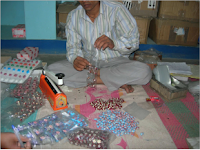 The chikan work of
The chikan work of  The designs depend for its effect on the variety of stitches and different grades of threads used to form the patterns which include, the lace like jali, the opaque fillings and the delicacy or boldness of outline and details. Tiny raised flowers done in what seem to be French knots are balanced by the flat stem stitch and large areas of open work to prevent either a crowded or too scattered appearance. The stitches employed are back-stitch, chain stitch, and hemstitch forming an open work pattern.
The designs depend for its effect on the variety of stitches and different grades of threads used to form the patterns which include, the lace like jali, the opaque fillings and the delicacy or boldness of outline and details. Tiny raised flowers done in what seem to be French knots are balanced by the flat stem stitch and large areas of open work to prevent either a crowded or too scattered appearance. The stitches employed are back-stitch, chain stitch, and hemstitch forming an open work pattern.  Individual floral motifs may embellish the entire garment or just one corner. Among the floral motifs embroidered, the jasmine, rose, flowering stems, lotus and the paisley motif are the most popular. Chikan work has a very light, gossamer - like quality. This makes it very suitable for the seemingly hot climate.
Individual floral motifs may embellish the entire garment or just one corner. Among the floral motifs embroidered, the jasmine, rose, flowering stems, lotus and the paisley motif are the most popular. Chikan work has a very light, gossamer - like quality. This makes it very suitable for the seemingly hot climate. Some of the popular motifs are Kairi; dhaniya patti; phanda; dhum patti; ghas, patti; murri; kangan; joda murri; maharaki; sadi-maharaki; daraz/ katub; pechani; tanire; gitti; phanda; keel; kangira.
 A Chikan suit is a regal treasure in any fashion connoisseur's wardrobe. Really the great thing about this form of embroidery is that it never goes out of fashion and it suits women/ men of all ages. If you are going to invest in a few pairs of elegant wear, try adding chikan to your wardrobe. If you wear chikan you really are wearing a piece of history, as it is a form of embroidery that has been art part of
A Chikan suit is a regal treasure in any fashion connoisseur's wardrobe. Really the great thing about this form of embroidery is that it never goes out of fashion and it suits women/ men of all ages. If you are going to invest in a few pairs of elegant wear, try adding chikan to your wardrobe. If you wear chikan you really are wearing a piece of history, as it is a form of embroidery that has been art part of Chikan embroidery in Lucknow is the biggest artisan cluster of India
There are about 4000 manufacturing units in Lucknow India





